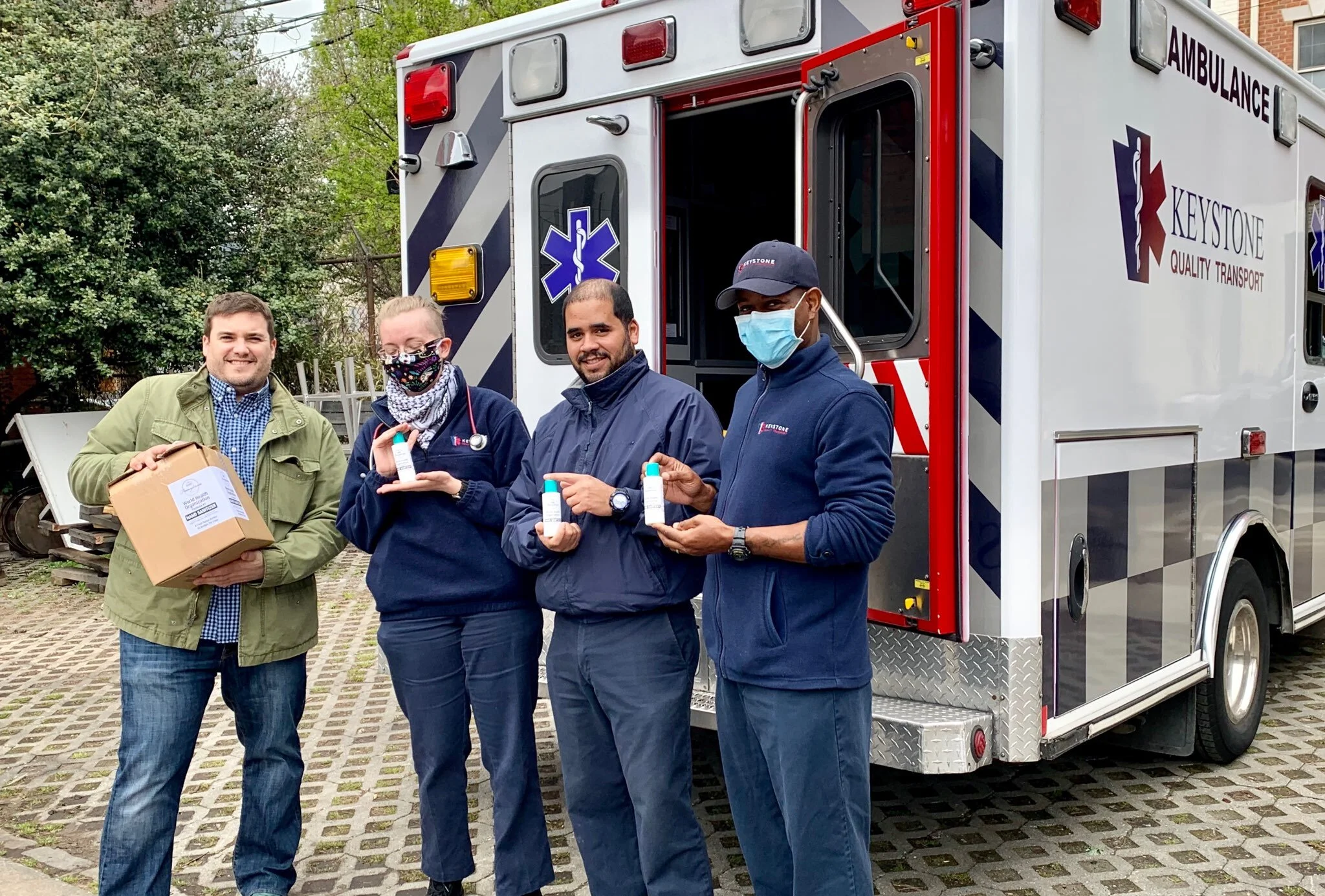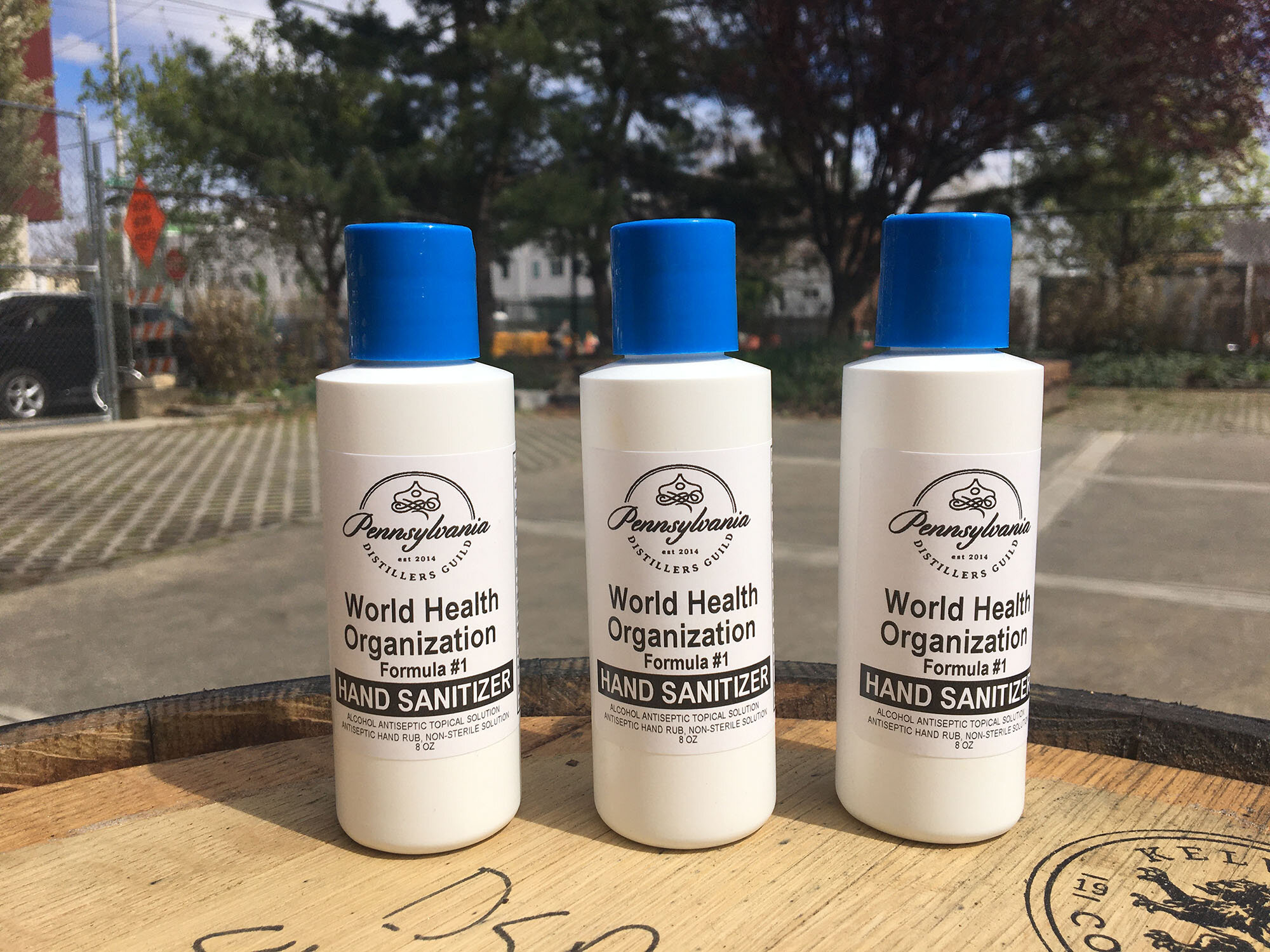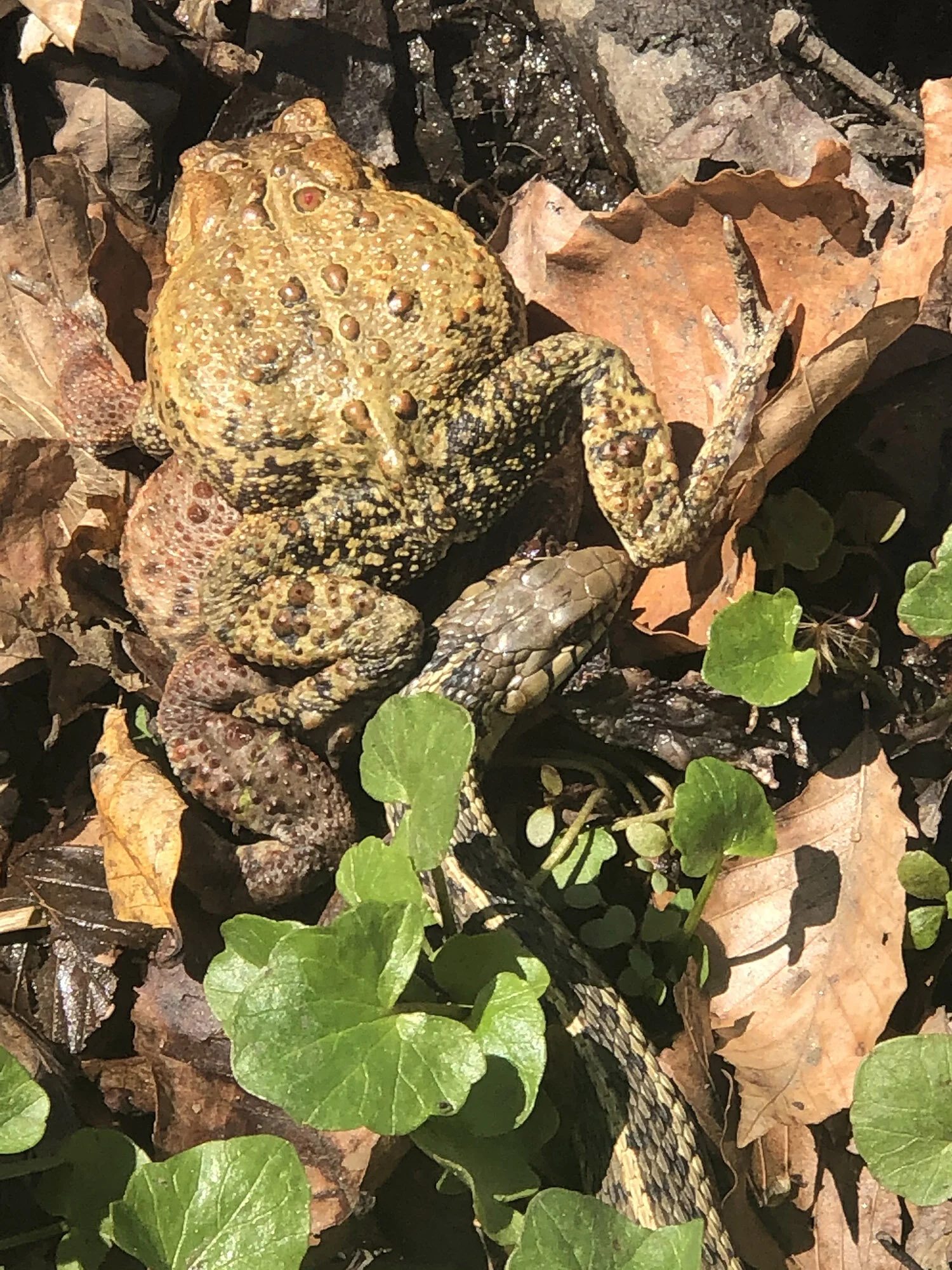Spirits to Sanitizer: How Local Distillers are Helping Fight the Coronavirus
Rob Cassell, left, delivers a small batch of hand sanitizer to Christine Williams, Anthony Santiago, and Reggie Dwyer of Keystone Quality Transport for immediate use. KQT hopes to have enough for all of their first responders to have their own bottle soon. Photo: Brian Eberle
When EMT Mike Gavin goes out in his ambulance to transport a discharged COVID-19 patient home from the hospital, he needs to be able to keep his hands clean.
Gavin’s employer, Keystone Quality Transport, started seeing an uptick in coronavirus patients two weeks ago, he says. Now, they transport several per day. “It’s crucial that we have stuff like hand sanitizer at our disposal as we handle more and more of these patients,” he emphasizes. “It’s not just for the patients, but for our crews, and for their families.”
KQT, like many medical providers, has struggled to acquire the personal protective equipment they need to function safely during the COVID-19 outbreak. Chief Operating Officer Justin Misner says hand sanitizer became unavailable from his usual suppliers in the middle of March. “The resources were depleted,” he says. “We tried to keep our ear to the street.”
They got lucky when the company’s risk and safety director, Brian Eberle, heard that Eight Oaks distillery, which makes bourbon, gin, and other spirits, had recently produced some hand sanitizer as well. “They told us, you can come out here, and we’ll give you some, but you’ve got to come now,” Misner reports. “We sent a driver out there immediately.”
What started as a modest experiment by a single distiller was about to get a lot bigger.
A Congresswoman Steps In
U.S. Rep. Mary Gay Scanlon of Swarthmore (PA-5) was frustrated by the federal administration’s response to the COVID-19 pandemic. She was looking to act locally when she heard about idled distilleries in other parts of the country making hand sanitizer. When she called the American Distilling Institute (ADI), “I got the president on the phone, because he was the only person [still] in the office.”
The ADI connected Scanlon with the president of the Pennsylvania Distillers Guild, Rob Cassell, who runs Philadelphia’s New Liberty Distillery. “He was already thinking, Okay, how do I get this done?” Scanlon says. “But there were a number of regulatory hurdles.” For example, a distillery normally pays tax on alcohol distilled into spirits, an unnecessary burden if the ethanol is used for cleaning rather than drinking. Scanlon’s staff began contacting the Food and Drug Administration, the Tobacco Taxation Bureau, and other federal agencies to secure waivers.
Cassell also needed working capital for plastic bottles and ingredients like glycerin and hydrogen peroxide. He needed workers for the bottling line. Scanlon had an idea about that too.
“I called Todd Strine because he’s an entrepreneurial type,” Scanlon says. “I forgot he runs an ambulance service.” Strine is the Chief Financial Officer of Keystone Quality Transport (as well as a publisher of the Swarthmorean).
No one was more aware than Strine of the acute hand sanitizer shortage. KQT was finding the product hardly available, except occasionally at very high prices. “Everybody’s price gouging,” Strine laments. His frontline staff — EMTs, paratransit van drivers, and safety teams — were worried about bringing the virus home to their families. “It could be because they live with elderly people like their parents or grandparents. It could be because they have an immunocompromised child or spouse. The last thing anyone wants to think is that, by going to work, you’d come home and harm your family.”
Strine credits Scanlon with swiftly grasping the situation and mobilizing local resources. U.S. Rep. Brendan Boyle and state senators Tim Kearney and Tom Killion were also involved in the effort. But it was Scanlon, Strine says, who “kicked the civilian population into gear.”
A Craft Spirits Pioneer
In 2005, Rob Cassell opened the first craft distillery in Pennsylvania, Philadelphia Distilling, with his uncle. Before that, he spent six years lobbying the state legislature to create a limited distillery license for craft gins and bourbons. There are now 130 craft distilleries across the state.
Cassell says that three months ago, “To allow distilleries to use their beverage ethanol for hand sanitizer would have been a joke at a cocktail party.”
His idea was not merely to produce hand sanitizer at his own New Liberty distillery, but to get all 130 Pennsylvania distilleries involved. Even with as few as 24 of them working together, he estimates they will turn out 400,000 - 450,000 bottles per day. “My dad, my grandfather, and my great-grandfather all did their civic duty as volunteer firemen,” Cassell says. “Hopefully this helps me to do my part.”
The project also creates jobs. “One day working with us on the bottling line, you can go to your grocery store and stock up,” Cassell notes. He looks forward to more hiring.
Strine agreed to lend the venture $50,000 interest-free. “An investment in safety,” he calls it. “The investment.” Others stepped up too. The public-private economic development corporation PIDC offered a line of credit. Drug Plastics in Boyertown supplied bottles. As of Friday, April 3, four distilleries were actively producing hand sanitizer: two in Philadelphia, one in Harrisburg, and one in Pittsburgh. “It doesn’t sound like much now,” Cassell says. “But we only just got all of our raw materials in on Wednesday.”
Pennsylvania Distillers Guild hand sanitizer on top of a just-emptied whiskey barrel at New Liberty Distillery. Photo: Rob Cassell
All the distilleries are bottling their product under the same label: the non-profit Pennsylvania Distillers Guild. The commonwealth has committed to buy 100,000 bottles immediately at cost ($1.52 for a 4-ounce bottle). After the first delivery, Pennsylvania will purchase an additional 1.3 million bottles. The state will distribute the bottles to medical facilities.
The guild will also sell 400,000 bottles to the U.S. Postal Service.
“This past weekend, a gentleman from Delco reached me at 11:00 at night,” Cassell recounts. The man, a first responder, was desperate to buy hand sanitizer: “How do I get the stuff?” he asked. “When can I get it? I think everybody’s shocked when I simply tell them, we’re doing this on behalf of the state. Reach out to your emergency county management person, and you’ll get it for free.”
Continuing Frustrations
“It was exciting to be able to actually get something done,” Rep. Scanlon says, “but it’s also a little bit frustrating. Because it’s the same kind of thing the federal government — the administration — should be doing.”
Scanlon and State Senator Tim Kearney are also working with local companies who would like to produce protective masks. But breakdowns in the supply chain and precise manufacturing specifications make these harder. “They require centralized guidance,” Scanlon says.
Strine agrees. “In an ideal world, we would have been prepared for this. We would have had the ability to do rapid tests. We would have had a health department. We would have had enough hand sanitizer and masks to go around...And we didn’t have any of that stuff. What Mary Gay [Scanlon] and Tim [Kearney] tried to do was figure out what resources we do have in our district that could be repurposed immediately.” Cassell calls Scanlon “a rock star of the everyday.”
The first truckload of hand sanitizer went out on Monday, April 6.
Cassell is working to share his story with other states, so they can replicate what’s being done here. After all, he says, “The virus doesn’t see an imaginary border across the farms between Pennsylvania and Ohio.”





